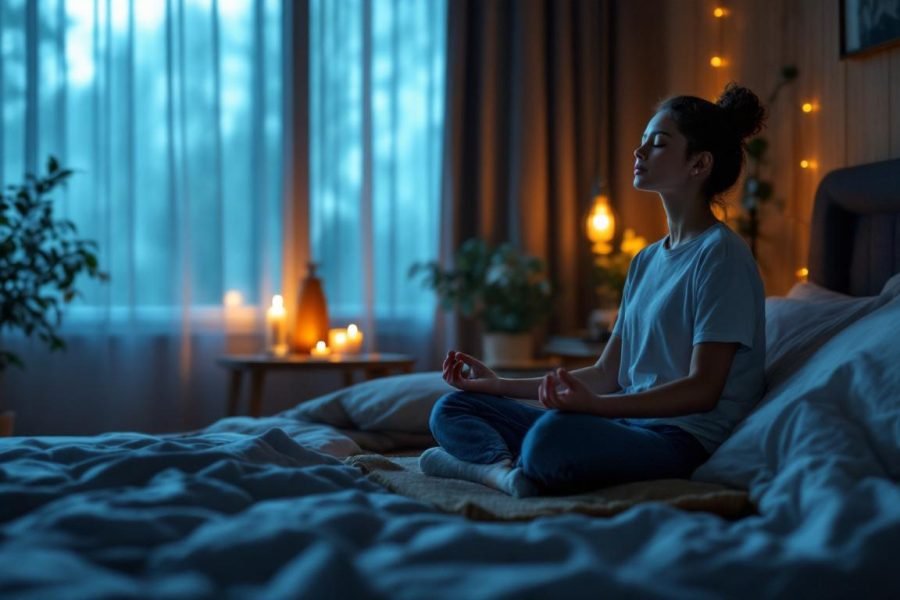After a busy day, it’s normal for the mind to be restless and the body tired. Sometimes, anxiety seems to grow precisely when the silence of the night arrives, and sleep, which should be natural, takes a long time to come. Night meditation emerges as a simple yet powerful ritual to transform these moments into peace and self-care.
In this time just for myself, I find space to disconnect from the day’s problems and rediscover my own rhythm. The practice doesn’t demand perfection, only presence. By making meditation a habit before bed, I bring more lightness, relaxation, and self-awareness to my nights, making rest more peaceful and restorative.
Why Meditating at Night Transforms Body and Mind

Practicing meditation before bed is not just an act of pausing, but an invitation for the body and mind to change together. Those who have experienced it know: a few minutes with closed eyes, in silence or guided by a calm voice, can transform how you feel and perceive everything around you. I will show you how this simple practice influences both the physical and emotional aspects and why it can be a turning point for more peaceful nights and smoother days.
Stress and Anxiety Reduction
When the day ends, the mind doesn’t always shut down at the same pace. Racing thoughts, worries, and mental lists can rob you of sleep and the lightness of the night. Night meditation acts as a natural brake, activating the body’s relaxation system.
Here are some clear effects I felt with a nightly meditation routine:
- I feel my heart slow down and my breathing deepen.
- Worries become more distant, as if being observed from afar.
- My body reacts with less muscle tension and less strain.
- My mind learns, little by little, to recognize anxiety triggers without getting lost in them.
Research shows that meditating at this time reduces cortisol levels, the so-called “stress hormone.” With each nightly session, my sense of inner security grows, and I become less susceptible to anxiety attacks or insomnia caused by repetitive thoughts.
Improved Sleep Quality
It’s no coincidence that so many people start meditating when they have trouble sleeping. Meditating at night has a direct impact on the sleep cycle. My sleep became deeper and more restorative when I started dedicating this time to myself before going to bed. The reason for this lies in the functioning of the brain and nervous system:
- The practice decreases the activity of the sympathetic nervous system, the one that “activates” the body for action.
- It increases the dominance of the parasympathetic system, responsible for relaxation and recovery.
- The initially turbulent mind becomes more serene, naturally creating the scenario for effortless sleep.
There are reports and studies indicating that those who meditate at night fall asleep faster and wake up less during the night. The body, instead of reacting to stress, begins to understand that this is the time to shut down, regenerate, and recharge energies.
Emotional Balance and General Well-Being
Beyond the immediate relief of tension, I notice that night meditation makes me more prepared to deal with challenging emotions. The effects are not limited to the night; they spread throughout the next day.
In practice, these are benefits like:
- More patience when dealing with unforeseen events.
- Less reactivity to conflicts.
- A feeling of peace and groundedness throughout the day.
- More clarity to understand my feelings and those of others.
Night meditation often serves as an emotional “reset.” It teaches the brain to recognize emotions without drowning in them, increasing the ability to respond instead of reacting automatically. This process strengthens resilience and self-awareness, creating a positive cycle that deepens each night.
If you also seek peaceful nights and lighter days, incorporating a few minutes of meditation before bed can be one of the best gifts you’ve ever given yourself.
How to Create a Night Meditation Ritual

A night meditation practice has the power to change how I lie down every night. Structuring a ritual is simpler than it seems, and the key lies in the details that prepare the body and mind to shut down. If your goal is to sleep better, silence racing thoughts, or just have some time for yourself, following a dedicated routine makes all the difference. I’ll show you how to prepare the environment, what steps to follow, and tips for truly maintaining this habit.
Preparing the Environment for Meditation
The place where we meditate makes all the difference. A cozy environment sends signals to the brain: now it’s time to relax. I usually follow a few rules to create a conducive atmosphere, even when everything around me is hectic.
- Turn off electronic devices at least 30 minutes before starting. The blue light from cell phones and TVs interferes with relaxation.
- Adjust the lighting. A soft or indirect light, like from a bedside lamp, calms the eyes and brain.
- Reduce noise. If possible, close doors and windows. Soft sounds, like rain or instrumental music, help create a relaxing background.
- Consider aromas. Incense, essential oils (lavender is my favorite), or even a warm tea contribute to an atmosphere of peace.
- Choose a spot. You don’t need a lot of space, just a mat, cushion, or even the edge of the bed. The important thing is to feel comfortable where you sit or lie down.
These details help the body understand that the moment is special, dedicated to your own care.
Simple Steps to Start the Practice
Putting the ritual into practice becomes much easier with a light and accessible structure. There’s no right or wrong way, and everyone finds their own rhythm. Here’s a simple guide to get started:
- Set a fixed time — I choose a moment after turning off the main lights, usually just before going to bed.
- Sit comfortably. You can sit cross-legged on the floor, leaning against the bed, or even lying down, as long as your back feels supported.
- Close your eyes and notice the contact of your body with where you are.
- Start with breathing. Three to five deep breaths through the nose, slowly exhaling through the mouth, already bring lightness.
- Choose a simple focus. Sometimes I use a guided meditation on my phone (dimming the screen brightness) or just follow the rhythm of my breath.
- If distractions appear, gently return attention to your breath or the ambient sound.
- Stay in the exercise for 10 to 20 minutes. You can use a timer with a soft chime to signal the end without worrying about time.
- Finish gradually. Open your eyes calmly, do a small stretch, and be grateful for this moment of self-care.
If you like, include positive affirmations or a gratitude journal in your routine. On nights of extreme fatigue, meditating while lying down, just listening to your breath, is already valid.
Tips for Maintenance and Consistency
Maintaining the habit of night meditation is a challenge for many people, including myself, on the busiest days. But small actions make the process more natural and enjoyable over time:
- Make the ritual a priority. Just like brushing your teeth, meditation can become a fixed part of your routine.
- Adjust the time. Even 5 minutes make a difference on busy days.
- Use reminders. I leave a silent alarm or a post-it near the bed. Seeing this signal before sleeping reinforces the commitment.
- Don’t demand perfection from yourself. Some nights are more restless, others profoundly relaxing. The commitment is to your well-being, not to performance.
- Celebrate regularity. Marking on a calendar or writing what you feel after each practice increases motivation.
- Seek variety. Experiment with different styles: guided, mindfulness, breathing, or visualizations. This way, your brain doesn’t fall into a rut, and the ritual doesn’t become monotonous.
- Create positive associations. Choose music, scents, or rituals that bring pleasure, making the moment anticipated and enjoyable.
With daily dedication or a few days a week, I notice that my body responds better to sleep, anxiety decreases, and my mind truly renews itself. The secret lies in consistency and kindness towards this moment just for myself.
Meditation Techniques for Relaxing Before Bed

Meditating before bed has become my favorite part of the day. I often say that these minutes of calm plant seeds for true rest. It doesn’t matter if you’re just starting now. The secret is to find simple yet powerful techniques that help the body slow down and the mind rest. Below, I share practical methods that facilitate this process, making the ritual more pleasant and effective.
Deep and Conscious Breathing
Breathing is one of the shortest paths to relaxing at night. I breathe consciously, feeling the air entering and leaving my body, and I notice how everything slows down. Practicing deep breathing activates the parasympathetic system, the body’s “natural brake,” signaling to the brain that it’s time to relax. I especially like the “3-6” technique:
- I inhale through my nose, counting to three, softly.
- I hold for a brief second.
- I slowly exhale through my mouth, counting to six.
I repeat this cycle for at least five minutes. If anxiety hits hard, I use counting to focus only on my breath, pushing away racing thoughts. Noticing how my belly rises and falls already brings a sense of grounding and control. If you prefer, try:
- Inhaling slowly, filling your abdomen.
- Exhaling with a relaxed jaw and tension-free shoulders.
- Visualizing tension leaving with each exhale.
Even on sleepless nights, this simple exercise changes the body’s energy. The mind tends to quiet, the heart slows down, and the feeling of heaviness decreases.
Mindfulness and Nighttime Self-Observation
Mindfulness, or full attention, transformed how I approach sleep. I don’t need to “empty my mind,” but rather to look at thoughts gently and without getting too involved. I do this sitting or lying down, with soft lights, paying attention to the present moment. How I practice at night:
- I close my eyes and observe my body’s sensations: weight, temperature, contact with the bed.
- I notice sounds around me, aromas in the room, even small details like the rustle of the sheets.
- If I notice a thought or worry, I simply acknowledge it: “I’m thinking about this now.” I don’t try to push it away, I just observe it passing like a cloud.
- I return my attention to my breath or body whenever my mind gets distracted.
This self-observation before bed helps identify emotions and release what doesn’t serve that moment. I can feel comforted, even in the face of tiredness or anxiety. It’s like giving a gentle “goodnight” to my own mind. The benefits appear quickly:
- Less resistance to sleep.
- Less self-criticism.
- More emotional lightness.
- A sense of presence that lasts until the next day.
Prayer, Gratitude, and Silent Reflection
I always end my day with a moment of silence, prayer, or gratitude. It doesn’t have to be linked to religion. Sometimes, I just mentally give thanks for the small victories of the day or for my family. This simple gesture already changes my inner state. Practical suggestions:
- Choose three to five things to be grateful for, even the simplest ones.
- Say a brief prayer or repeat a positive phrase silently.
- Recall something good that happened or a passage that inspires you.
- Stay for a few minutes in silence, feeling a lighter heart.
These final minutes act as an internal hug. Using gratitude before bed shifts the focus from what went wrong and creates an atmosphere of peace. Sleep comes more serenely, and I wake up with more positive ideas. I include reflection whenever I can:
- I mentally review my day, highlighting what I learned or managed to let go of.
- I take a deep breath, visualizing my mind emptying of worries.
- I let a small smile appear, feeling calm and embraced.
These practices, though simple, have the power to end the daily cycle gently, pushing away burdens and allowing the body and mind to truly rest.
Conclusion
By setting aside a few minutes to meditate before bed, I create space for my body and mind to breathe a sigh of relief. I gain more peaceful nights and wake up feeling lighter and clearer to face the next day. Transforming the last hour of my day into a personal care ritual allows tensions to remain outside the bedroom door.
Even on busy days, I can choose this gift: a silent pause, a deeper breath, a kinder look at myself. I give myself this chance to sleep better, relax more, and wake up with renewed energy.
Today is a good day to start, without demanding perfection. Just an honest intention and a few minutes of dedication are enough. If meditating at night has already changed my story, I know it can change yours too.
Thank you for joining me this far. Leave your experience, question, or tip about this ritual in the comments, and inspire others to take better care of their nights.






Deixe um comentário